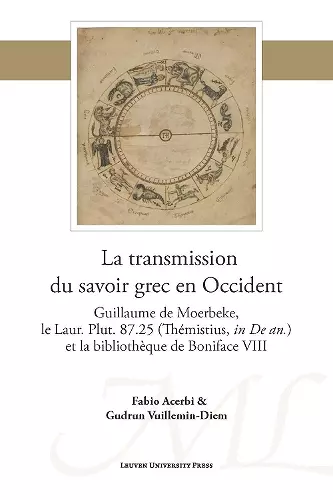La transmission du savoir grec en Occident
Guillaume de Moerbeke, le Laur. Plut. 87.25 (Themistius, in De an.) et la bibliotheque de Boniface VIII
Gudrun Vuillemin-Diem author Fabio Acerbi author
Format:Paperback
Publisher:Leuven University Press
Published:3rd Apr '19
Currently unavailable, our supplier has not provided us a restock date

Mise au point definitive de l'episode central de la transmission du savoir grec en Occident. Les relations entre la bibliotheque papale a la fin du XIIIe siecle et le celebre traducteur Guillaume de Moerbeke constituent l'episode central de la transmission du savoir grec en Occident. Ce livre presente une mise au point definitive de la question, en prenant comme cas d'etude une traduction de Moerbeke dont le modele grec, actuellement conserve a Florence, faisait partie de la bibliotheque de pape Boniface VIII.
Das Buch ist eine akribische textkritische und kodikologische Untersuchung des um 1200 kopierten Plut. 87.25 der Bibl. Medicea Laurenziana in Florenz, welcher neben Aristoteles’ De anima und der Paraphrase dieses Werks von Themistios ein kurzes griechisch-lateinisches Glossar zu den philosophischen Termini in De anima enthält. Die beiden Vf. können durch detaillierten Textvergleich nachweisen, dass dieser Codex jene Vorlage gewesen sein muss, die Wilhelm von Moerbeke für seine im November 1267 in Viterbo abgeschlossene Übersetzung der Paraphrase benützt hat, und wichtige Erkenntnisse für die literarische Technik dieser und weiterer Übersetzungen Wilhelms (wie etwa einiger Exzerpte des Kommentars von Philoponus zu De anima) gewinnen.
M. W., Deutschen Archiv 78-2 (2022)
In short, this is a landmark study. Not only does it solve, insofar as possible, several crucial issues on Moerbeke and the formation of the papal library in the late thirteenth century, but it also provides a model to be followed by future scholars interested in the transmission of knowledge from Byzantium to the West. Michele Trizio, Speculum 97/2 (April 2022)
Les index (p. 229-254) des passages cités ou mentionnés, des mss, des noms de personnes ou d’ouvrages, des lieux géographiques facilitent la consultation de cet ouvrage qui opère une mise au point sur laquestion des relations entre la bibliothèque papale et le traducteur Guillaume de Moerbeke, dont il permet de déceler la méthode de travail. R. Casteels, Scriptorium, 2020, 2
Voilà donc un utile volume, tant pour les philologues que pour les historiens du livre et des bibliothèques, qui éclaire le travail de l'un des traducteurs les plus importants pour la connaissance d'Aristote et d'autres textes philosophiques dans l'Occident médiéval. [...] ce livre apporte une contribution importante à la connaissance de l'œuvre de Guillaume de Moerbeke, de ses conditions de travail et de ses sources, et une pierre de plus dans l'étude des livres grecs de la bibliothèque papale à la fin du 13e siècle.Matthieu Cassin, The
Medieval Review 21.01.12
Acerbi’s and Vuillemin-Diem’s enquiry into Plut. 87.25 offers an example of a fruitful methodology of study whose basic premise is to consider a manuscript as a historical document with many values. One may examine the content of the manuscript, which illuminates the philosophical “acculturation” of medieval Latin Europe, particularly in the second half of the thirteenth century. The importance of Aristotle’s De anima and of the series of Greek and Arabic commentaries for the development of philosophical and theological discourse between the middle of the thirteenth century and the middle of the fourteenth century requires us to reconsider Moerbeke’s contribution in shaping a crucial part of the medieval Latin philosophical language. In this respect, the Florentine manuscript should be considered a relevant document for European intellectual history, providing the opportunity to study the translation activity of William of Moerbeke, improving our understanding of his role as a cultural mediator between the Greek philosophical world and Latin Europe. However, Acerbi’s and Vuillemin-Diem’s research adds a further perspective. The identification of the origin of Plut. 87.25, which was one of the manuscripts of the Greek collection of Boniface VIII, links it to the papal library, whose development was deeply involved in the political relations and diplomatic exchanges between Rome and Constantinople. These became a crucial ‘door’ by which philosophical culture entered into Latin Europe.
Riccardo Sacceti, BMCR 2020.06.32, https://bmcr.brynmawr.edu/2020/2020.06.32/
ISBN: 9789462701694
Dimensions: 234mm x 156mm x 15mm
Weight: 405g
266 pages